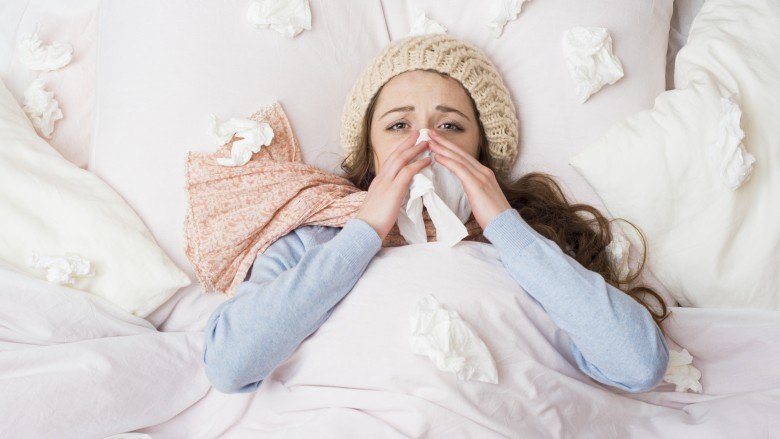Going from sexually active to sexless is relatively common, especially in long-term relationships. You may find yourself no longer having sex due to a breakup, changes in your health or life stress. While sex isn’t necessary for overall wellness, there is scientific proof that physical intimacy, arousal and orgasm can invite some pretty awesome benefits you may miss out on by going sex-free. This is what happens to your body when you stop having sex, and it’s not all pleasant.
You might have a wet dream or two

Like an over-hormonal teenage boy, women who aren’t having sex regularly will find that their body will remind them what they’re missing in their sleep. This will especially happen if your sex life is not only at a standstill, but you’ve also given up on masturbating.
Researchers had it easy when they were studying nocturnal emissions in men, the most obvious reason being because men have erections that are visible and ejaculate as proof that they’ve climaxed. With women, it was more complex.
For researchers to collect data on female arousal during their sleep, they had to measure heart rate, do brain scans, and watch for temperature jumps near the clitoris. While it wasn’t easy, they managed to get it done and later revealed in a study that 37 percent of women will have a wet dream before the age of 45 and that they’re most common in women between the ages of 40 and 50. So, if it’s been a while since you’ve gotten lucky, you can expect these little presents to find their way into your subconscious.
High-stress levels

The endorphins released during sex are ideal for leaving your worries behind and putting an instant smile on your face. So when you’ve gone a while without any nookie, you might notice that your stress level builds up.
If you’re not one to get off as often as you’d like, have no fear! It’s not only those endorphins that help reduce stress levels, it’s those acrobatic moves we try in the bedroom as well. Sex can be a form of exercise, which we all know fights off stress and anxiety, so if you aren’t getting any these days, try not to skip your cardio workouts.
If it wasn’t bad enough that without sex you’re feeling overstressed, you might also have high blood pressure. One study determined that those who had sex over a two-week period had significantly lower blood pressure levels than those who were without sex or even compared those who masturbated or participated in sexual activities that excluded intercourse. So even taking care of things yourself or making out a bit won’t help your stress levels very much. In this case, women actually do need a partner.
Your immune system suffers

Seems like having sex provides some key benefits to our health, but when we’re not rolling around in the sheets with our partner, we actually more susceptible to illness too. According to the Mayo Clinic, the DHEA, or Dehydroepiandrosterone hormone is released during arousal, with even more released when you orgasm. This hormone gives your immune system a bit of a boost, helping your body to fight against bacteria, viruses, and other pretty nasty germs.
While not having sex certainly doesn’t mean you’re going to come down with some major illness, you’ll be missing out on some of these other great benefits as well. The DHEA hormone is also said to act as an antidepressant, make your skin look great, help repair any damaged skin tissue faster, and even increase apprehension and learning abilities.
A study of college students also found higher levels of immunoglobulin A, an antibody that is important for immune function, in those who had sex at least once or twice a week when compared to those who didn’t. So, no sex means no antibody to fight off the cold!
Self-Judgment and Lower Self-Esteem

Shifting from sexually active to sexually sedentary may also damage your relationships in another way — including the relationship with yourself. “From a medical perspective, having less sex will not affect neurotransmitters or medical diseases,” said gynecologist, Sheila Loanzon, M.D. “However, it is the emotions and judgments that we superimpose on ourselves that can be detrimental.” Minimal sex or sex drive can lead to a smorgasbord of emotional challenges, such as self-judgment, embarrassment and anxiety. “These emotions begin to fester internally and can extend to our relationships and be palpable to partners,” she adds.
A Less Toned Vagina

Regular vaginal sexual activity, whether with a partner or solo, promotes vaginal health. This is especially important from midlife and beyond, according to the North American Menopause Society, because dryness and less elasticity are a common result of hormonal shifts. Sex play stimulates blood flow to your genitals, helping to keep your vaginal muscles toned and maintaining their current length and stretchiness. Similar to managing erectile dysfunction, this tends to make sex more appealing and enjoyable as well.
Less Lubrication

When you are sexually active, whether female or male, you probably notice that wetness plays a major role in arousal. Sexual excitement stimulates glands that produce wetness in the vagina. If a woman no longer feels turned on regularly or at all, they may experience vaginal dryness — which can make any sex you have painful. While there are other causes of “down there” dryness, such as hormonal imbalances associated with menopause, routine masturbation or couple play may make all the difference.
You feel depressed

It’s tough to say which comes first, low sexual activity or low moods, but research shows a significant link between the two, according to a report published in the Journal of Economic Behavior and Organization in May 2015. If you’re feeling down or depressed, you may be less interested in sex. Given the feel-good perks of sex, however, there’s also a fair chance that going from a robust sex life to very little sex could contribute to blah moods. Engaging in foreplay and sex somewhat regularly may be just what the doctor ordered.
Low libido

While it can have the opposite effect, having less sex may lead you to desire less sex over time. Many people and sex experts report that “use it or lose it” applies to your libido. From a physical standpoint, if having little to no sex has detrimental effects on your sexual health — causing vaginal dryness or erectile dysfunction, for example — you and your body may become less easily or frequently aroused. And the less habitual sex becomes, the more you may gradually grow accustomed to not having it or begin seeing yourself as less sexual. Think of it as a snowball effect.

